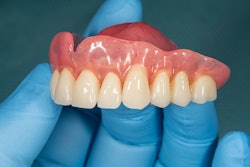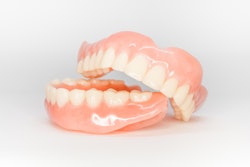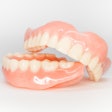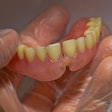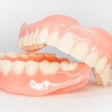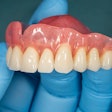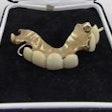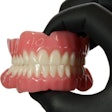Dentures that fit well may be linked to a lower risk of all-cause mortality in older adults with reduced posterior occlusal support. The large study was published November 29 in the Journal of Prosthetic Dentistry.
As bite support degenerates, wearing poor-fitting dentures -- or not using them at all -- may be correlated with a greater risk of mortality.
"For those with decreased posterior occlusal support, well-fitting dentures can mitigate mortality rates," wrote the authors, led by Dr. Tomoaki Mameno, PhD, of Osaka University in Japan.
As the global population ages, tooth loss among older adults has become more prevalent, affecting their oral function and overall health. Although dentures have been used to improve the chewing function of adults, their long-term effects on mortality remain unclear, according to the study.
To better understand the correlation between dentures and the mortality rate in older adults with reduced occlusal support, 186,893 individuals 75 and older who underwent dental exams were included in a longitudinal study. The participants were categorized based on their occlusal support status using the Eichner index, and proportional hazards regression analyses examined the association.
Considerably higher hazard ratios (HRs) for mortality were seen with occlusal support deterioration, ill-fitting dentures, and those who didn't wear dentures. The highest hazard ratios were in those with no teeth or dentures, the authors wrote.
The HRs (with 95% confidence intervals) were lowest in the following that wore well-fitting dentures:
- 0.98 (0.90-1.06) in those with three occlusal support zones with contacts in the anterior area only
- 1.02 (0.95-1.10) in those with two occlusal support zones with contacts in the anterior area only
- 1.11 (1.03-1.19) in those with one occlusal support zone with contacts in the anterior area only
- 1.14 (1.07-1.22) in those with contacts in the anterior area only
- 1.15 (1.05-1.26) in those with no occlusal support zones but teeth in both arches
- 1.28 (1.21-1.37) in those with no occlusal support zones but teeth in one arch
- 1.58 (1.46-1.72) in those who were edentulous
However, the study had limitations. The patients' history of chronic diseases was determined based on the medication usage recorded over the past six months. Therefore, those not taking medications were considered to have no history of the disease, they wrote.
Nevertheless, these results may add significantly to the understanding of the importance of prosthodontic treatment for patients with missing teeth and inform public health policies that promote the well-being of older adults, the authors wrote.
"These findings underscore the importance of adequate denture care in maintaining the health and survival of older adults," Mameno and co-authors wrote.





